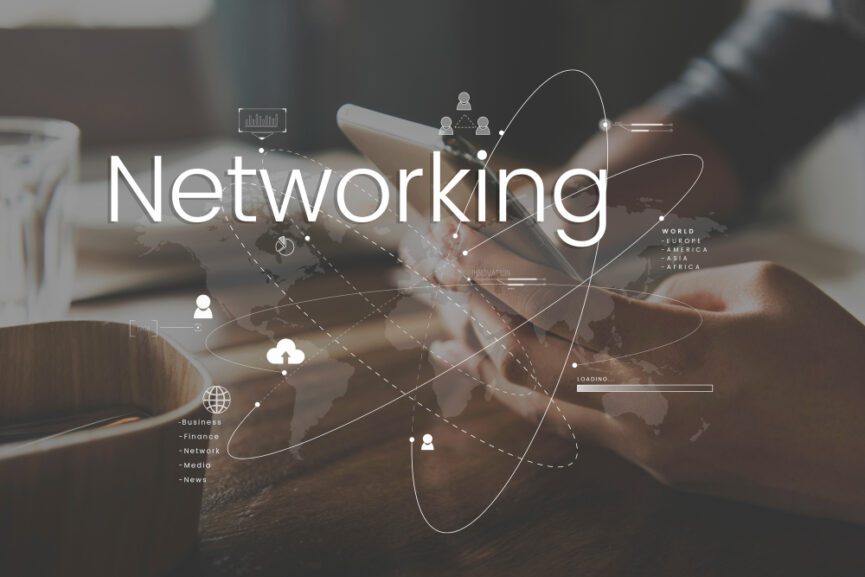Networking in today’s world, with the development of technology and the rapid development of communication networks, is considered as one of the key factors in the success of businesses. In addition to creating effective connections and communication, networking provides new possibilities and opportunities for businesses.
By establishing and developing the right and effective relationships with customers, colleagues, competitors and other industry members, businesses can significantly gain a competitive advantage.
In this article, we examine the concept of networking and examine its role in the success of organizations. Also, we will examine the methods, principles and strategies that organizations can use in networking and developing their relationships. Also, to read more articles about business organization, you can refer to the articles page.
What is Networking?
Networking refers to the process of creating and developing effective and mutual relationships with individuals, organizations, customers, colleagues, competitors and other members of the industry. In fact, networking deals with establishing active communication and establishing strong relationships with others locally and internationally.
Networking is very important because strong and effective relationships create new opportunities, share information, access resources and even collaborate on joint projects and businesses. By building mutual networks and effective communication, businesses will be able to access more information, improve markets, better understand customer needs, and even consult competitors as potential business partners or collaborators.
Networking can be done in different ways, including attending events, conferences and professional meetings, being active in social networks and even making direct connections with people and organizations.
Since social networks and virtual space have become widely available, networking has appeared in a new way in businesses. Communication between people and organizations, according to technology and new opportunities, provides the possibility of exchanging knowledge, information, resources and even cooperation at the international level. As a result, it gives organizations the opportunity to effectively interact with their customers and benefit from the knowledge and experience of others.
Networking Strategy
To effectively implement networking, we can use the following strategies and tactics:
Target Identification:
First, we must define our goal in networking. Do we want to communicate with customers? Are we looking for cooperation with similar industry organizations? Or maybe we are looking to attract new colleagues or competitors. Defining the goal helps us to move in the right direction in networking.
Establishing Active Communication:
For effective networking, we need to establish active connections with other people and organizations. Participating in professional events, meetings and conferences, being active in social networks related to our business field and establishing direct connections with important and influential people in the industry are methods that allow us to establish effective relationships.
Value Presentation:
To attract and maintain relationships, we must provide value to other people and organizations. Sharing useful information and experiences, providing guidance and advice, collaborating on joint projects and businesses, as well as providing resources and facilities can help us strengthen our relationships.
Maintenance and Care of Relationships:
To be successful in networking, it is very important to maintain and nurture existing relationships. This includes establishing constant communication with people, following up and responding to their needs and requests, attending joint events and activities, and appreciating the cooperation and achievements of people and organizations with whom we have a relationship. Establishing constant communication and showing interest and interest in relationships makes the relationship stronger and more stable.
Use of Communication Technology:
Due to the advancement of technology, the use of tools and platforms based on the Internet and communication technology can help us in networking. The use of social networks to communicate and share content, the use of customer relationship management (CRM) tools to track and manage relationships, and the use of virtual tools to hold meetings and collaborate on projects make it possible to improve networking.
Development of Mutual Networks:
Collaborating with organizations and people who are in the same industry as us can help strengthen our networking. By exchanging information, experiences and resources with like-minded people and organizations, we can further share opportunities and take advantage of joint collaborations.
Cooperation Approaches:
Collaborating with individuals and organizations on joint projects and businesses can help network and develop relationships. This can lead to deeper and stronger relationships with people and organizations. By collaborating on projects, we share different resources, experiences and expertise, which not only strengthens the relationship, but also helps to develop our business.
Creating Support Networks:
In networking, creating support networks and advisory groups can be very helpful. By finding people who work in the same fields and face similar challenges and issues, we can take advantage of their experiences and opinions and learn from others to reduce errors and make necessary improvements.
Flexibility and Adaptability:
Networking requires flexibility and adapting to industry and market changes. We must pay attention to changes and new trends in the industry and update our network based on these changes. Also, while networking, we must react and respond to the needs and changes of our applicants.
Time Management:
In networking, time management is very important. You should consider your time to establish and maintain relationships and plan carefully. Setting priorities and improving time management skills can help us create and maintain effective networking relationships. With proper planning and using time management tools and techniques, we can simultaneously manage different relationships and achieve success in networking.
Therefore, we should note that networking is a dynamic and planned process. It requires patience, consistency and continuous progress. By implementing networking strategies and methods, we can establish stronger relationships, access more resources and information, and bring new opportunities to our business.

Benefits of Networking
Networking has many advantages that can be summarized as follows:
Access to Resources and Information: Networking allows us to access various resources and information. By establishing effective relationships with various individuals and organizations, we can access financial resources, expertise, knowledge, experience and sales networks that can be critical to the growth and development of our business.
Creating Business Opportunities: Networking creates new business opportunities. By establishing relationships with different people and organizations, we may have opportunities for cooperation, business and communication with new customers. Also, by building strong networks, we can access new forms of marketing and sales.
Sharing Experiences and Knowledge: Networking provides the possibility of sharing experiences and knowledge with other people. By connecting with people in similar industries and fields, we can tap into their experiences and avoid the pitfalls and mistakes they’ve experienced along the way. Also, it is possible to learn and update in different fields through communication with network members.
Increasing Job Opportunities and Professional Connections: By creating and developing strong networks in the business field, new job opportunities are presented to us. Connecting with people in our industry can help us exchange information about job opportunities, employment and starting a business. Also, networking increases professional connections with successful and influential people in our field.
Problem Solving and Support: Networking allows us to access support and guidance from other people in our network when facing issues and challenges. By consulting and cooperating with people who have experienced similar experiences or who have useful knowledge and resources, we can find suitable solutions for our problems and take advantage of their experiences.
Why is Networking Important?
Networking is very important in business because:
Access to Resources and Information:
Networking allows us to access various resources and information. By establishing effective relationships with various individuals and organizations, we can access financial resources, expertise, knowledge, experience and sales networks that can be critical to the growth and development of our business.
Creating Business Opportunities:
Networking creates new business opportunities. By establishing relationships with different people and organizations, we may have opportunities for cooperation, business and communication with new customers. Also, by building strong networks, we can access new forms of marketing and sales.
Sharing Experiences and Knowledge:
Networking provides the possibility of sharing experiences and knowledge with other people. By connecting with people who operate in the same industry and fields, we can take advantage of their experiences and avoid the warnings and errors that they have experienced while passing through the paths. Also, it is possible to learn and update in different fields through communication with network members.
Strengthening Relationships and Trust:
Networking allows us to establish more effective relationships with people and organizations and build more trust. Strong relationships with business partners, customers, suppliers, and even competitors can help create lasting collaboration and greater business success. Mutual trust and effective relationships make others trust us, offer us cooperation opportunities, and turn to us in times of need.
Increasing Influence in the Market:
By establishing effective relationships and developing networks, we will have more power to penetrate the market. Communication with different people and organizations offers us business and cooperation opportunities. We can use our network to develop relationships with new customers, enter new markets and expand our business activities.
Support in facing Challenges:
Networking allows us to access the support of other people in our network when facing various challenges and issues. These people may have similar experiences or share knowledge and resources that may be useful to us. This can help in solving problems and finding appropriate solutions.
Common Mistakes in Business Networking:
In the networking process, common mistakes can occur that can have negative effects on business performance. In the following, we will examine some of them.
Failure to Use Social Networks Effectively:
Using social networks like LinkedIn to connect with people in the industry and search for job opportunities can be useful. But it is a mistake if you only send job applications and act without communicating and adding value to others.
Failure to Comply with the Ethical Rules of Networking:
Some mistakes in networking include misuse of personal information, spamming and misrepresentation. Respect and ethics should always be followed in relation to others.
Not Taking Care of Previous Relationships:
Business networking should be built on long-term relationships. If you are willing to communicate only when you need help from others and forget about it otherwise, this is a mistake.
Non-Interaction:
In business networking, effective and active interaction with people and your networks is very important. This includes responding to messages and requests, attending professional events, sharing resources, and staying in touch with people in your network.
Failure to Appreciate the Value of Network People:
In effective networking, you must pay attention to the value of the people in your network. This includes providing help, support and sharing information and resources. If you only ask for requests and are not helpful to others in return, it can weaken your network.
Lack of Diversity in the Network:
Connecting with people from different backgrounds, industries, and positions will help you gain access to newer resources and opportunities. If you only connect with people who are similar to you, this can limit your access to information and opportunities.

What Types of Questions Should Ask People During Networking?
When networking with people, you can ask questions to build relationships and get useful information. Here are some examples of questions you can ask:
1.About their expertise and work experience:
-What areas do you specialize in?
-What is your work experience?
-What kind of projects or industries have you worked in?
2.About their network and connections:
-Do you have a network of people and professional connections?
-What people and organizations are you in contact with?
3.About similar experiences:
-Have you had similar experiences with people or companies operating in our field?
-Are you familiar with similar problems and challenges that you may encounter in our business?
4.About collaboration and cooperation:
-Are you interested in working with us?
-How do you think we can achieve effective cooperation?
5.About available resources and communications:
-Do you have any resources that are useful for our project?
-Can you help us from your communication network?
6.About guidance and consultation:
-Can you help in providing guidance and consultation in the field of problems and challenges of our business?
-Do you have any experience regarding effective strategies and solutions in our field?
7.About cooperation opportunities:
-Are you interested in collaborating on joint projects or activities?
-Do you see imaginable cooperation opportunities in the fields where we operate?
8.About experiences and technical knowledge:
-Do you have special experiences and technical knowledge that can be effective in improving the performance and quality of our business?
-Can you share resources, tips or information that will help us grow and develop?
9. About providing resources and communication with business partners:
-Are you able to help us with sourcing, providing goods or services, or communicating with business partners?
-Can you bring us suitable offers or business contacts from your communication network?
By asking these questions and using their answers, you can expand your professional connections and get the resources and knowledge you need to grow and develop your business.
Up to Sum
In this article, we have provided comprehensive explanations about networking and its benefits. Networking gives companies access to vast resources and information, creates new business opportunities, and facilitates the sharing of experiences and knowledge. Also, it strengthens relationships and trust, increases job opportunities and professional connections, and is effective in problem solving and support. As a result, the use of networking can help improve the performance and growth of companies. Considering these benefits, networking should be considered as an important strategy in business planning and management. Stay with the specialists of Uprodemy website to get business advice and international trade.


